Lexus NX vs Nissan Leaf – Differences & prices compared
Compare performance, boot space, consumption and price in one view.
Find out now: which car is the better choice for you – Lexus NX or Nissan Leaf?
The Lexus NX (SUV) comes with a Full Hybrid or Plugin Hybrid engine and Automatic transmission. In comparison, the Nissan Leaf (Hatchback) features a Electric engine with Automatic transmission.
When it comes to boot capacity, the Lexus NX offers 545 L, while the Nissan Leaf provides 394 L – depending on how much space you need. If you’re looking for more power, decide whether the 309 HP of the Lexus NX or the 217 HP of the Nissan Leaf suits your needs better.
In terms of consumption, the values are 1 L per 100 km for the Lexus NX, and 16.70 kWh for the Nissan Leaf.
Price-wise, the Lexus NX starts at 45200 £, while the Nissan Leaf is available from 30800 £. Compare all the details and find out which model fits your lifestyle best!
Lexus NX
The Lexus NX embodies a sophisticated blend of striking design and luxurious comfort, providing an exceptional driving experience. Its hybrid powertrain offers seamless performance, ensuring both efficiency and a smooth ride. Inside, high-quality materials and innovative technology create an atmosphere of modern elegance and convenience.
details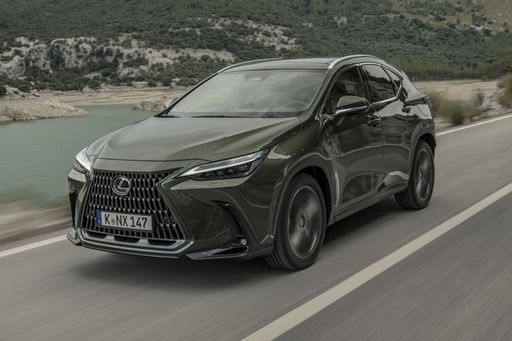 @ toyota-media.de
@ toyota-media.de
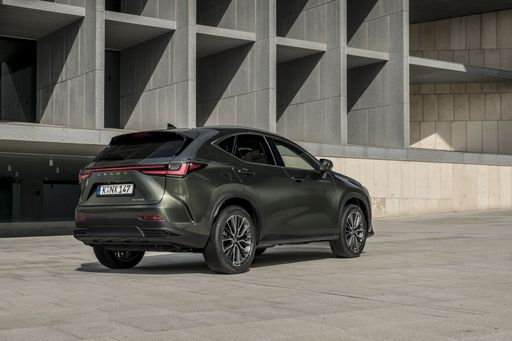 @ toyota-media.de
@ toyota-media.de
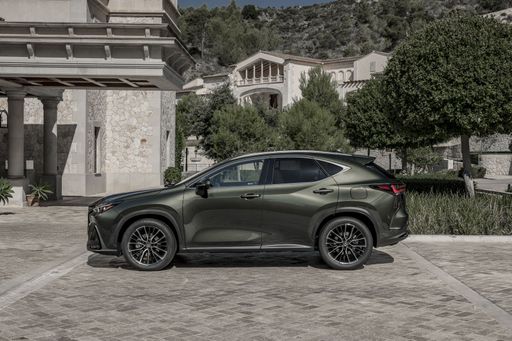 @ toyota-media.de
@ toyota-media.de
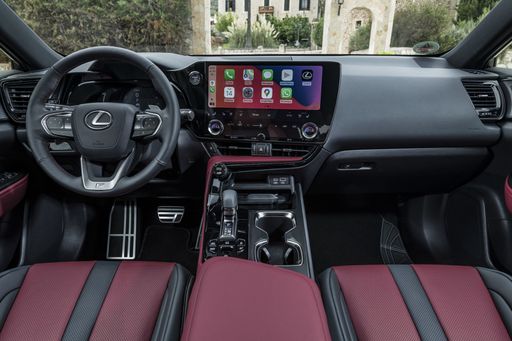 @ toyota-media.de
@ toyota-media.de
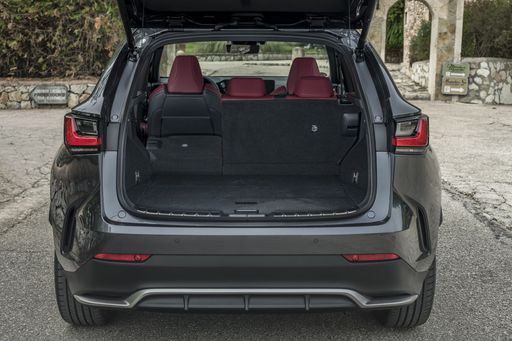 @ toyota-media.de
@ toyota-media.de
Nissan Leaf
The Nissan Leaf stands out as a pioneering model in the realm of electric vehicles, known for its impressive blend of practicality and eco-friendliness. It offers a smooth and quiet driving experience, making it an ideal choice for city commuting and longer journeys alike. The interior design is both comfortable and intuitive, providing drivers with a sense of modernity and ease of use.
details @ germany.nissannews.com
@ germany.nissannews.com
 @ germany.nissannews.com
@ germany.nissannews.com
 @ germany.nissannews.com
@ germany.nissannews.com
 @ germany.nissannews.com
@ germany.nissannews.com

|

|
|
|
|
Costs and Consumption |
|
|---|---|
|
Price
45200 - 63400 £
|
Price
30800 - 37200 £
|
|
Consumption L/100km
1 - 6 L
|
Consumption L/100km
-
|
|
Consumption kWh/100km
-
|
Consumption kWh/100km
16.7 - 17.8 kWh
|
|
Electric Range
68 km
|
Electric Range
270 - 385 km
|
|
Battery Capacity
-
|
Battery Capacity
39 - 59 kWh
|
|
co2
22 - 135 g/km
|
co2
0 g/km
|
|
Fuel tank capacity
55 L
|
Fuel tank capacity
-
|
Dimensions and Body |
|
|---|---|
|
Body Type
SUV
|
Body Type
Hatchback
|
|
Seats
5
|
Seats
5
|
|
Doors
5
|
Doors
5
|
|
Curb weight
1805 - 2065 kg
|
Curb weight
1580 - 1756 kg
|
|
Trunk capacity
545 L
|
Trunk capacity
385 - 394 L
|
|
Length
4660 mm
|
Length
4490 mm
|
|
Width
1865 mm
|
Width
1788 mm
|
|
Height
1670 mm
|
Height
1540 - 1545 mm
|
|
Payload
475 - 515 kg
|
Payload
384 - 415 kg
|
Engine and Performance |
|
|---|---|
|
Engine Type
Full Hybrid, Plugin Hybrid
|
Engine Type
Electric
|
|
Transmission
Automatic
|
Transmission
Automatic
|
|
Transmission Detail
-
|
Transmission Detail
Reduction Gearbox
|
|
Drive Type
All-Wheel Drive, Front-Wheel Drive
|
Drive Type
Front-Wheel Drive
|
|
Power HP
244 - 309 HP
|
Power HP
150 - 217 HP
|
|
Acceleration 0-100km/h
6.3 - 8.7 s
|
Acceleration 0-100km/h
6.9 - 7.9 s
|
|
Max Speed
200 km/h
|
Max Speed
144 - 157 km/h
|
|
Torque
-
|
Torque
320 - 340 Nm
|
|
Number of Cylinders
4
|
Number of Cylinders
-
|
|
Power kW
179 - 227 kW
|
Power kW
110 - 160 kW
|
|
Engine capacity
2487 cm3
|
Engine capacity
-
|
General |
|
|---|---|
|
Model Year
2024
|
Model Year
2019
|
|
CO2 Efficiency Class
D, B
|
CO2 Efficiency Class
A
|
|
Brand
Lexus
|
Brand
Nissan
|
Lexus NX
An Introduction to the Lexus NX: A Technological Marvel
The Lexus NX, a stunning SUV, has made a name for itself in the competitive automotive market with its blend of striking design, advanced technology, and impressive performance. From hybrid innovation to state-of-the-art features, the NX line-up continues to reflect Lexus's commitment to luxury and efficiency.
Powertrain Innovation: Hybrid Technology at Its Best
One of the standout features of the Lexus NX is its hybrid drivetrain. Offering both full-hybrid and plug-in hybrid models, the NX showcases Lexus's ongoing commitment to reducing emissions while maintaining performance. The full-hybrid variant boasts 244 PS, combining efficiency with dynamic driving experience. Alternatively, the plug-in hybrid model provides a total of 309 PS and an economical fuel consumption rate of just 1 L/100km, with an electric-only range of up to 68 km, perfect for emission-free urban commutes.
Performance Specs: Speed and Comfort Combined
The Lexus NX doesn't compromise on performance. With a top speed of 200 km/h, it accelerates from 0 to 100 km/h in a brisk 6.3 to 8.7 seconds, depending on the model. The SUV maintains a respectable and eco-friendly fuel consumption range of 1 to 6 L/100km, emphasising its capability as both a powerful road vehicle and an environmentally conscious choice.
Design and Dimensions: A Perfect Blend of Space and Style
Measuring 4660 mm in length, 1865 mm in width, and 1670 mm in height, the Lexus NX offers a spacious and comfortable ride without compromising on style. The interior provides ample space with a generous boot capacity of 545 L, perfect for those long journeys with family or friends.
Advanced Features: Luxury and Safety at the Forefront
Lexus prioritises safety and luxury, evident in the NX's comprehensive array of features. Equipped with the latest CVT gearbox, the NX ensures a smooth and efficient ride. The adaptive front-lighting system, pre-collision system, and lane departure alert are just a few of the advanced safety features available, providing peace of mind on every journey.
Efficiency and Affordability: Balancing Cost and Value
The Lexus NX is not only a powerhouse of luxury and efficiency but also an economically viable option. With CO2 emissions ranging from 22 to 135 g/km, the NX models fall into favourable efficiency classes (D to B), allowing potential savings in environmental taxes. Furthermore, its monthly running costs are estimated between €1,330 and €1,631, offering excellent value for such an advanced vehicle.
Conclusion: The Lexus NX - Where Innovation Meets Elegance
The Lexus NX proves to be a strong contender in the premium SUV segment, showcasing a compelling mix of innovation, performance, and luxury. Its advanced hybrid technologies, sleek design, and spacious interior make it an attractive option for those seeking a vehicle that aligns with both their environmental consciousness and their desire for luxury. Lexus continues to set a high benchmark in the automotive industry, making the NX a worthy choice for modern drivers.
Nissan Leaf
Introduction to the Nissan Leaf: A Pioneer in Electric Mobility
The Nissan Leaf has established itself as a trailblazer in the realm of electric vehicles (EVs) since its launch. As we delve into its present-day iterations, the Leaf continues to soar in popularity due to remarkable advancements in technology and sustainability. Let's explore what makes the Nissan Leaf a standout in today's automotive market.
Power and Performance: Under the Hood of the Nissan Leaf
The Nissan Leaf boasts a power output ranging from 150 to 217 PS, depending on the battery option chosen. The vehicle's electric motor, a product of cutting-edge engineering, offers instant torque ranging from 320 to 340 Nm, resulting in impressive acceleration capabilities. The 0 to 100 km/h dash is achieved in as little as 6.9 seconds, showcasing its prowess in electric performance.
Battery Technology: Efficient Energy Management
When discussing the Nissan Leaf, battery technology is at the forefront. The available battery capacities range from 39 to 59 kWh, supporting an electric range between 270 to 385 km. This flexibility allows drivers to choose a model that best fits their driving habits, providing peace of mind for longer journeys without frequent recharging.
Sustainability: The Environmental Edge
One of the primary attractions of the Nissan Leaf is its commitment to sustainability. As an all-electric vehicle, it produces zero CO2 emissions, placing it in the top tier of the CO2-efficiency class with an 'A' rating. This clean energy approach contributes significantly to reducing environmental impact and supports Nissan's drive towards a greener future.
Design and Comfort: Aesthetic Appeal and Practicality
The Nissan Leaf is not just about efficiency; it's also designed for comfort and utility. With its sleek hatchback body and dimensions of 4490 mm in length, 1788 mm in width, and a height of up to 1545 mm, it offers ample interior space. The boot capacity ranges from 385 to 394 litres, providing sufficient storage for everyday needs. The model accommodates five passengers comfortably, ensuring a pleasant ride for everyone.
Innovations and Safety: Advanced Features for Peace of Mind
Nissan equips the Leaf with an array of intelligent features that enhance safety and convenience. The available equipment lines, including N-CONNECTA, Tekna, e+ N-CONNECTA, and e+ Tekna, offer varying levels of technology integration. ProPILOT Assist, e-Pedal, and a comprehensive suite of driver-assistance technology are just a few examples that highlight Nissan's commitment to innovation in the EV market.
Conclusion: The Nissan Leaf Continues to Lead
With prices ranging from €35,900 to €43,400, the Nissan Leaf remains an attractive choice for those looking to embrace electric mobility. It perfectly balances performance, design, and sustainability, making it a compelling choice in the competitive EV landscape. The Nissan Leaf not only represents the future of driving but also reinforces why it continues to be a leader in the electric vehicle community.
Which drive types are available for the Lexus NX?
Available as .
The prices and data displayed are estimates based on German list prices and may vary by country. This information is not legally binding.
